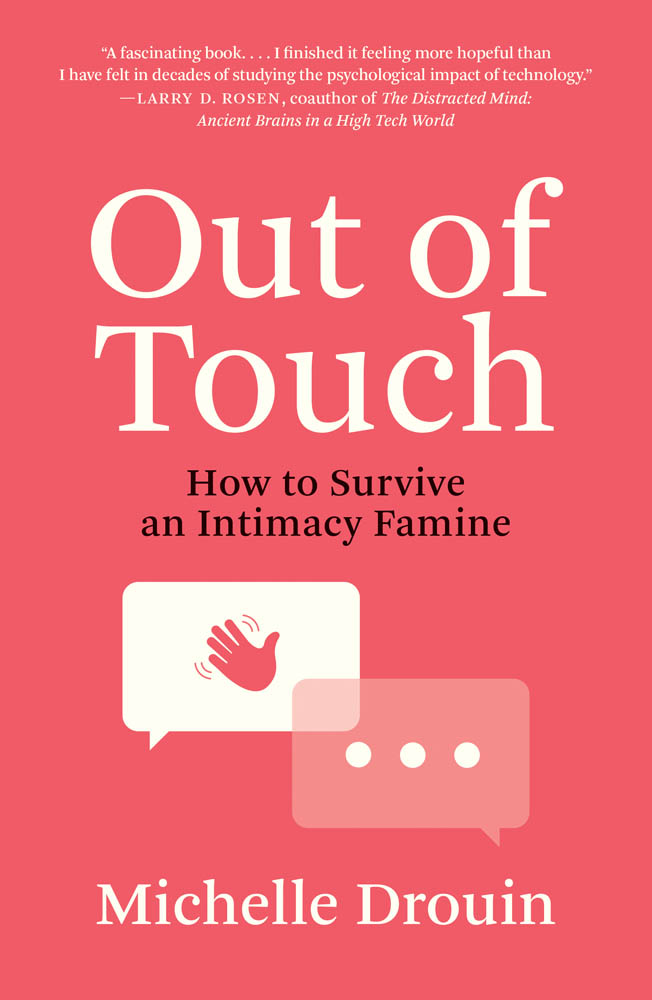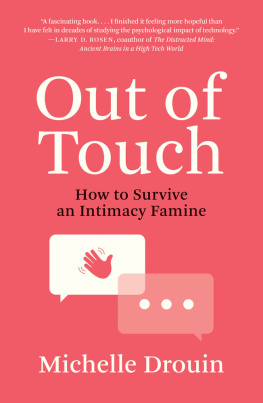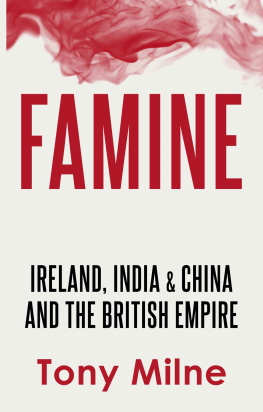Michelle Drouin - Out of touch : how to survive an intimacy famine
Here you can read online Michelle Drouin - Out of touch : how to survive an intimacy famine full text of the book (entire story) in english for free. Download pdf and epub, get meaning, cover and reviews about this ebook. year: 2022, genre: Home and family. Description of the work, (preface) as well as reviews are available. Best literature library LitArk.com created for fans of good reading and offers a wide selection of genres:
Romance novel
Science fiction
Adventure
Detective
Science
History
Home and family
Prose
Art
Politics
Computer
Non-fiction
Religion
Business
Children
Humor
Choose a favorite category and find really read worthwhile books. Enjoy immersion in the world of imagination, feel the emotions of the characters or learn something new for yourself, make an fascinating discovery.
- Book:Out of touch : how to survive an intimacy famine
- Author:
- Genre:
- Year:2022
- Rating:3 / 5
- Favourites:Add to favourites
- Your mark:
- 60
- 1
- 2
- 3
- 4
- 5
Out of touch : how to survive an intimacy famine: summary, description and annotation
We offer to read an annotation, description, summary or preface (depends on what the author of the book "Out of touch : how to survive an intimacy famine" wrote himself). If you haven't found the necessary information about the book — write in the comments, we will try to find it.
Out of touch : how to survive an intimacy famine — read online for free the complete book (whole text) full work
Below is the text of the book, divided by pages. System saving the place of the last page read, allows you to conveniently read the book "Out of touch : how to survive an intimacy famine" online for free, without having to search again every time where you left off. Put a bookmark, and you can go to the page where you finished reading at any time.
Font size:
Interval:
Bookmark:

Michelle Drouin
The MIT Press
Cambridge, Massachusetts
London, England
2022 Massachusetts Institute of Technology
All rights reserved. No part of this book may be reproduced in any form by any electronic or mechanical means (including photocopying, recording, or information storage and retrieval) without permission in writing from the publisher.
The MIT Press would like to thank the anonymous peer reviewers who provided comments on drafts of this book. The generous work of academic experts is essential for establishing the authority and quality of our publications. We acknowledge with gratitude the contributions of these otherwise uncredited readers.
This book was set in Adobe Garamond Pro by New Best-set Typesetters Ltd.
Library of Congress Cataloging-in-Publication Data
Names: Drouin, Michelle, author.
Title: Out of touch : how to survive an intimacy famine / Michelle Drouin.
Description: Cambridge, Massachusetts : The MIT Press, [2022] | Includes bibliographical references and index.
Identifiers: LCCN 2021031208 | ISBN 9780262046671 (hardcover)
Subjects: LCSH: Interpersonal relationsPsychological aspects. | Intimacy (Psychology) | CommunicationSocial aspects. | InternetSocial aspects. | Social media.
Classification: LCC BF724.3.I58 D76 2022 | DDC 158.2dc23
LC record available at https://lccn.loc.gov/2021031208
10987654321
d_r0
This started as a book about technology and its effects on intimacy. But as I was writing, it got much bigger. Or rather, my scope shifted as I realized there is no online and off-line life. There is just life. Beautiful, complicated life.
Over the last few decades, through my consumption and creation of research in a variety of fields, including psychology, information technology, communication, and medicine, I have become convinced that as our understanding of humans becomes more and more comprehensive, our understanding of basic human needs has become more focused. Humans need few things to thrive. Aside from food and water, we need to feel safe and secure. We need to feel competent and able to meet lifes challenges. And we need to feel connected and loved. Certainly, richer and more varied experiences will get us to higher planes. We might grow wise. Creative. Connected to a higher purpose. But these are just bonuses in the journey of a well-lived life.
Technology has added a shiny and impressive sidecar to this journey. Some of the technological innovations Ive witnessed in my lifetime would have been as unimaginable to me thirty years ago as Willy Wonkas shrinking of Mike TV during his tour of the chocolate factory. We have nanobot surgeries and self-driving cars. Cell phones and geotracking. I can rewind live television. Luckily there are people on this planet, far smarter and more innovative than I am, who saw a way forward when I didnt. They used their creativity to harness the power of basic mechanics, physics, mathematics, and biology to improve the world in immeasurable ways.
This has led to exponential growth in almost every sector of business as we have modernized machinery and systems that move faster and more efficiently. Our standard of living continues to rise and is projected to keep getting better over the next fifty years. We are getting smarter and living longer. Humans are thriving.
And yet with the release of research on declining mental health, especially among teens and young adults, and the expos films regarding big tech and social media, we have become acutely suspicious of this sidecar. Now passengers in our shiny new toy, are we perhaps deviating from the journey?
Anyone who ever watched the Disney film WALL-E, an animated feature depicting a dystopic future world where weve had to evacuate Earth because of pollution, has seen a glimpse of the technological future we fear most. In the film, humans, who are no longer ambulatory because of obesity, drive around all day in little individual vehicles talking via video to others while ignoring the people right next to them. It is actually eerily similar to the vision Ive seen lately in restaurants as Ive watched members of a family all consumed in their devices, paying no attention to the person right beside them.
Certainly, technology has changed communication. There is no denying that. No one is forcing us to use this technology, however, so perhaps its meeting our basic needs. Through our cell phones and computers, we are becoming more of who we want to be. But is this WALL-E future likely? Probably not. Maybe the endgame for communication technology is that it will facilitate our own human tendencies to connect, be entertained, and seek knowledge. No nonambulatory humans. No evacuation of a polluted Earth. In all likelihood, we will all be just fine.
As I mentioned, though, this book is not just about technology. Through the next chapters, I will take you on a journey through the life course, focusing on different times of life and the different entities with which a human will typically interact in their lifetime. Sure, technology is featured, as no modern-day journey through life would exclude it. But the main focus is on what we need as humans. Our triumphs and struggles, and the ways in which we become who we are as social beings in this world.
Several times in this book, and the title obviously, I suggest that we are living through an intimacy famine. By intimacy, I dont mean sex or physical expressions of love necessarily. As a sexuality researcher, I do concentrate on these topics, but throughout the book, I take a broader stance. Millions of people around the world are not getting the physical, emotional, intellectual, and experiential intimacy they crave as humans. For some of them, its a lifelong condition. They are sad, lonely, and severely isolated. For others, its a momentary phasea time when they feel rejected or disconnected from others. For all of us, though, its time for us to examine the choices we make in the way we are living our lives and the ways in which these choices affect how intimately connected we feel to others.
This book isnt just about you and your own intimacy. Its a vehicle for you to feel intimately connected to others and the struggles they feel when they are starving for the love, touch, inspiration, and connection they need. You might get it on a daily basis. Others might never experience those moments. In the end, I hope you emerge with the understanding that there is no my life and their life. There is just life. Beautiful, complicated life.
Do you have a sister? Sophia asked.
It was her first question to me, and Sophia was unaware, Im sure, about how deeply these words cut me.
She then blinked, a slow blink, her piercing blue eyes directed straight toward mine, and shifted her head slightly the way one does when they are interested in your response. For a moment I felt like Sophia was more than just a culmination of programmed scripts and algorithms, and everything else in the room (a director, two camerapeople, lights, and the floor-to-ceiling view of Hong Kongs skyline) disappeared. She had inadvertently homed in on a major issue in my life: my strained relationship with one of my sisters. And while I could happily wax lyrical about my other siblings, my career, my interests, and nearly any other topic, this was one topic I wanted to avoid. I felt exposed, and it felt intimate. So I did what every good psychologist does. I redirected.
Next pageFont size:
Interval:
Bookmark:
Similar books «Out of touch : how to survive an intimacy famine»
Look at similar books to Out of touch : how to survive an intimacy famine. We have selected literature similar in name and meaning in the hope of providing readers with more options to find new, interesting, not yet read works.
Discussion, reviews of the book Out of touch : how to survive an intimacy famine and just readers' own opinions. Leave your comments, write what you think about the work, its meaning or the main characters. Specify what exactly you liked and what you didn't like, and why you think so.









